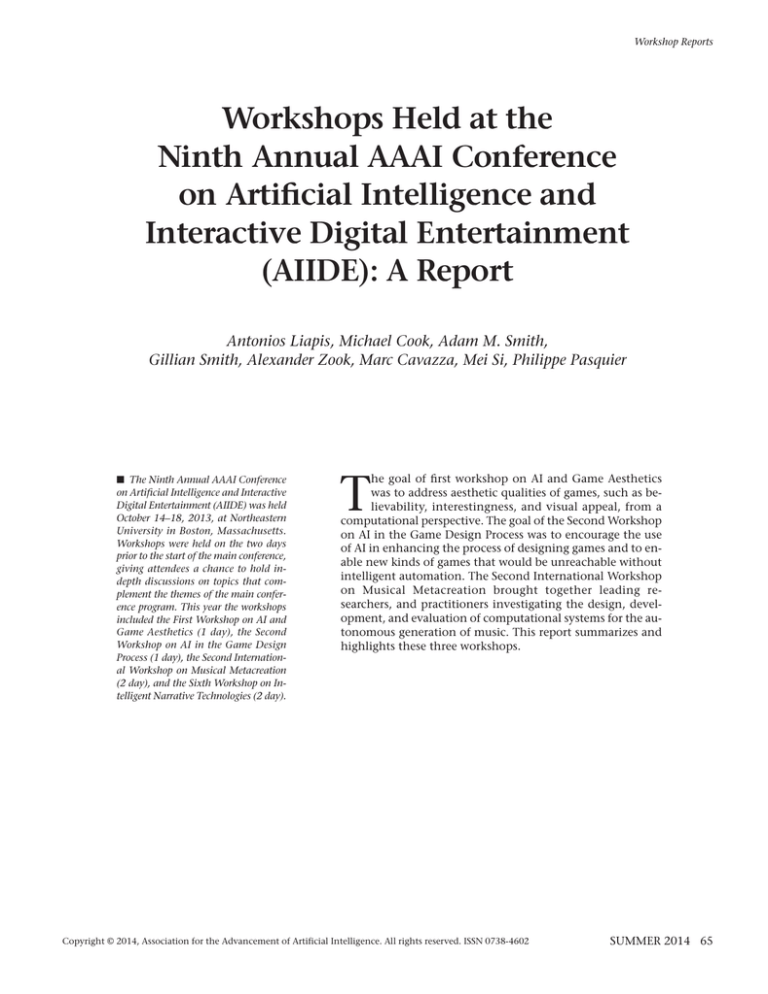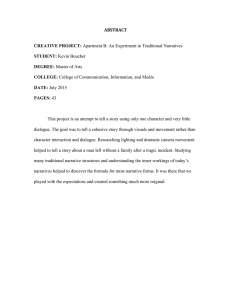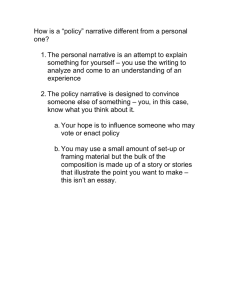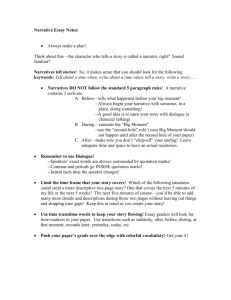
Workshop Reports
Workshops Held at the
Ninth Annual AAAI Conference
on Artificial Intelligence and
Interactive Digital Entertainment
(AIIDE): A Report
Antonios Liapis, Michael Cook, Adam M. Smith,
Gillian Smith, Alexander Zook, Marc Cavazza, Mei Si, Philippe Pasquier
n The Ninth Annual AAAI Conference
on Artificial Intelligence and Interactive
Digital Entertainment (AIIDE) was held
October 14–18, 2013, at Northeastern
University in Boston, Massachusetts.
Workshops were held on the two days
prior to the start of the main conference,
giving attendees a chance to hold indepth discussions on topics that complement the themes of the main conference program. This year the workshops
included the First Workshop on AI and
Game Aesthetics (1 day), the Second
Workshop on AI in the Game Design
Process (1 day), the Second International Workshop on Musical Metacreation
(2 day), and the Sixth Workshop on Intelligent Narrative Technologies (2 day).
he goal of first workshop on AI and Game Aesthetics
was to address aesthetic qualities of games, such as believability, interestingness, and visual appeal, from a
computational perspective. The goal of the Second Workshop
on AI in the Game Design Process was to encourage the use
of AI in enhancing the process of designing games and to enable new kinds of games that would be unreachable without
intelligent automation. The Second International Workshop
on Musical Metacreation brought together leading researchers, and practitioners investigating the design, development, and evaluation of computational systems for the autonomous generation of music. This report summarizes and
highlights these three workshops.
T
Copyright © 2014, Association for the Advancement of Artificial Intelligence. All rights reserved. ISSN 0738-4602
SUMMER 2014 65
Workshop Reports
The Twenty-Seventh Annual Conference on
Innovative Applications of Artificial Intelligence
The First Winter IAAI Conference
January 25–29, 2015 Austin, Texas USA
David Gunning, Conference Chair
Peter Z. Yeh, Conference Cochair
www.aiide.org/iaai15
The First Workshop on
AI and Game Aesthetics
The interactive nature of games sets them apart from
other popular media such as television, film, and music. Games are unique in that their components
(from the rules and goals of the game to the appearance of avatars and their dialogue) must encompass
both functional and aesthetic prerequisites. Artificial
intelligence usually focuses on the functional quality of such game components, for example, ensuring
that an avatar can traverse a level in minimal time or
that AI can win over any human in a strategy game.
However, there are many different aesthetic considerations that artificial intelligence can address, such
as which AI behaviors maximize player satisfaction
while still being challenging, or which weapon,
avatar, or level would appeal to a particular player.
The Workshop on AI and Game Aesthetics provided a forum to discuss the development both of software and of computational models pertaining to the
subjective and aesthetic qualities of games, such as
creativity, believability, and challenge. The workshop
consisted of the presentation of five accepted papers
and an invited talks session, which brought in four
pieces of related work. The proceedings papers covered a wide spectrum of topics, from the aesthetic
qualities of puzzle configurations to the symbolic
meaning of content in games. While targeting different domains such as dance or computer-aided design,
each paper put forth a computational model of aesthetic quality, including models constructed from
theory, models learned from game data, and models
tailored to specific users. The invited talks session included papers accepted as posters to the AIIDE conference as well as recently published work; the invited talks were well-received as a complement to the
proceedings papers and covered several related areas
that stimulated discussion.
A theme of contested subjectivity emerged from
the workshop, as many submissions discussed com-
66
AI MAGAZINE
peting standards for subjective qualities of games,
such as beauty or challenge. Granted that studying
the subjectivity of game aesthetics was one of its
main goals, future versions of the workshop will explore this theme and help foster further discourse.
The workshop was accompanied by an evening
event, DAGGER, which drew together local game developers and academic research projects. Acting both
as an exhibition and as an informal gathering, the
DAGGER event allowed attendees to interact directly with a wide variety of game types and technologies, as well as with their developers. As events such
as DAGGER help bridge the gap between theoretical
research and practical applications of it, similar
events are planned to be held alongside the workshop in the future.
Antonios Liapis, Michael Cook, and Cameron
Browne served as cochairs of this workshop. The papers of the workshop were published as AAAI Technical Report WS-13-19.
The Second Workshop on
AI in the Game Design Process
Game AI has grown beyond the specific application
AI techniques to controlling opponents and other
virtual characters in a game. There are many problems that AI is well suited to solve that arise from
deeper integration of AI into the game design process
itself. How can retrieval, inference, knowledge representation, learning, and search loosen bottlenecks
during design? How can AI be put to use in ideation,
prototyping, feedback, visualization, synthesis, and
verification of designed artifacts? How can AI provide assistance to designers or share the creative responsibility?
The Workshop on AI in the Game Design Process
embraced interdisciplinary approaches to game AI
that are true to authentic game design concerns, operating outside of a strictly scientific perspective. The
theme of the workshop, which grew from the work-
Workshop Reports
shop’s first iteration held in 2011, asked participants
to reflect on how to provide real-time and interactive
feedback to designers during the design process. In
response, participants shared systems and position
papers that aligned to four main themes: (a) real-time
visual feedback during design, (2) exploratory tools
for designers, (3) using declarative knowledge representation and constraints, and (4) player modeling
and analytics.
We saw a system that made emergent behavior visible on an interactively editable map, and heard a
proposal for generic infrastructure for continuous
game-play trace sampling that would keep these design-time views up to date. We saw a design exploration tool for a commercial puzzle game that leveraged exhaustive search techniques as well as a
simulation-based player behavior preview tool integrated into the widely used Unity game development
environment. We heard about how to use formal ontologies to validate game implementations, and saw
the use of grammars and other structural constraints
for controllably shaping the space of a map generator’s output. We saw and discussed the use of machine-learning techniques, in contact with game analytics, for modeling player behavior and using that
to provide data-informed feedback on novel designs.
Following the morning paper presentations, the afternoon session for the workshop was devoted to a
lively group discussion on a variety of topics of interest to the community, which converged upon
three main discussion groups addressing: evaluation
and generalization, player modeling, and automated
QA as a service. Outcomes from this discussion included a set of future research directions in how to
evaluate creative systems, what success means for
such systems, and how to design new AI systems
whose role in the design process is that of a colleague
with the human designer. There were also several
suggestions for concrete systems that could be built,
including a dynamic matchmaking system that
would reason over how individuals cooperate in multiplayer online battle arena (MOBA) games in order
to ensure that teams will cooperate and have fun together. Finally, there was a suggestion for creating a
cloud-based automated testing service that would
make computationally intensive, AI-based design automation accessible to a wider audience.
Adam M. Smith, Gillian Smith, and Mark J. Nelson
cochaired the workshop. Papers from the workshop
were published as AAAI Press Technical Report WS13-20.
The Sixth Workshop on Intelligent
Narrative Technologies
Narratives are a pervasive aspect of human culture
and are one of the core frameworks people use to
view and understand the world. People use narratives
for social interaction, education, and entertainment.
Narratives as forms of knowledge representations
have long held interest among AI and cognitive science researchers alike. Imbuing technologies with
narrative intelligence to represent and reason on narratives holds great promise. Narrative technologies
deepen our understanding of the human mind, and
enhance computational systems to more naturally
communicate with human users. Further, these technologies augment the human capacity for expression
to enable new forms of narrative experiences.
The Workshop on Intelligent Narrative Technologies aimed to advance research in artificial intelligence for the computational understanding and expression of narrative. Previous meetings of this
workshop have brought together a multidisciplinary
group of researchers including computer scientists,
psychologists, narrative theorists, media theorists,
artists, and members of the interactive entertainment
industry. From this broad expertise, the workshop focuses on computational systems that represent, reason about, adapt, and perform interactive and noninteractive narrative experiences. This includes
fundamental research in relevant fields such as natural language processing, believable agents, commonsense reasoning, and human narrative experiences.
Creating narratives through authoring tools and
narrative generation was a major theme at the 2013
workshop. Authoring tools augment human capabilities for crafting narrative experiences. Tools for validating interactive narratives (Kim Dung Dang and
Ronan Champagnat) and automatically converting
narrative events into virtual world actions (Alexander Shoulson, Mubbasir Kapadia, and Norman I.
Badler) demonstrated the range of methods for supporting authors.
Narrative generation investigates how AI systems
can automatically create all or part of a narrative. The
workshop participants learned methods for generating aspects of narratives including character-centered
narrative plots (Bilal Kartal, John Koenig, and
Stephen J. Guy), language expression for narratives
(Marilyn Walker, Jennifer Sawyer, Carolynn Jimenez,
Grace Lin, Elena Rishes, and Noah Wardrip-Fruin),
and cognitive models of narratives (Justin Permar
and Brian Magerko).
Text mining and natural language processing
emerged as prominent new themes at this workshop.
Online blogs and social media provide a massive
repository of narratives and a rich source of knowledge for understanding and creating narratives. Several presenters discussed methods for mining personal narratives from the web (Andrew Gordon,
Luwen Huangfu, Kenji Sagae, Wenji Mao, and Wen
Chen) and deriving formal features of narratives such
as narrative clauses (Elahe Rahimtoroghi, Reid Swanson, Marilyn A. Walker, and Thomas Corcoran) or
character roles (Josep Valls-Vargas, Santiago Ontanon, and Jichen Zhu).
One of the workshop’s key strengths is bringing to-
SUMMER 2014 67
Workshop Reports
gether researchers from diverse disciplines. The workshop featured prominent discussions of how literary
and cognitive models are used in narrative technologies. Michael Mateas (University of California, Santa
Cruz) delivered a keynote lecture highlighting a
wealth of real-world narrative craft practices that
could be explored in narrative technologies. His
speech also emphasized the need for intelligent narrative technologies researchers to build playable systems.
The Workshop on Intelligent Narrative Technologies also explored challenges of knowledge engineering in narrative through a panel on encoding the story of the Iliad in the PDDL planning domain
language. Three teams discussed their experiences in
encoding the Iliad. Panel members discussed issues in
the application of knowledge representation for interactive storytelling and other narrative technology
applications. The domains created will be available
online in the future.
Marc Cavazza (Teesside University), Mei Si (Rensselaer Polytechnic Institute), and Alexander Zook
(Georgia Institute of Technology) organized the
workshop. The workshop papers were published as
AAAI Press Technical Report WS-13-21.
The Second International Workshop
on Musical Metacreation
There are many forums presenting the advances in
the practice and theory of computer music, or computational creativity. However, no academic peer-reviewed event focuses solely on generative music. As
explicit in its name, this new workshop series was
created to fill this gap, with a strong focus on musical metacreation, that is, endowing software with
musical creativity. Building on the success of the first
edition, the Second International Workshop on Musical Metacreation was extended to a two-day event
that marked a significant step toward the formation
of an international research network focused on the
automatic generation of music, and its application to
professional music creation, new music compositions and performance, interactive game music, and
the like.
While open to the usual problems covered in computer music, such as providing computational models for music perception, representation, and cognition, the workshop focused on the challenges specific
to generative music. For example, the composition
problem is to generate a composition (often represented as a score), while the interpretation problem
is to generate an audio rendering of a given composition. Systems that address these two canonic problems or any related ones cover the whole spectrum
between: (1) symbolic computing vs. raw audio signal processing, (2) corpus-based systems that have
been exposed to musical compositions or interpretations versus systems that generate from first princi-
68
AI MAGAZINE
ples, computational heuristics, and expert knowledge, (3) individual vs. collective musical creativity,
(4) entirely generative systems vs. interactive computer-assisted musical creativity.
In its second iteration, the workshop included 21
contributions selected through peer reviewing out of
34 submissions. Technical papers, position papers,
and demonstrations were evenly spread across theory and practice. Topics included deep learning for
music, computational music theory, the evaluation
and aesthetics of automated music generation, as
well as exploration of the various ways to interact
with, or control, such generative systems. As a novelty in this edition, two industrial talks were included
in the program that helped shape a discussion on
how best to integrate these generative systems into
existing music and audio production software.
As the field matures, more and more generative
music systems get applied and meet their audience.
This is for example the case with the MUME-WE concert series, as well as with the Algorave movement.
One of the main outcomes of this year’s workshop
was a question regarding the best ways to present and
frame these systems when they meet their audience,
whether it is in live shows, on records, or as part of
software systems.
This workshop was cochaired by Philippe Pasquier,
Arne Eigenfeldt, and Oliver Bown, and the proceedings of the workshop were published as AAAI Press
Technical Report WS-13-22.
Antonios Liapis is a Ph.D. student at the Center for Computer Games Research, IT University of Copenhagen, Denmark.
Michael Cook is a Ph.D. student and research associate in
the Computational Creativity Group, Goldsmiths College
London, UK.
Adam M. Smith is a postdoctoral researcher at the University of Washington.
Gillian Smith is an assistant professor in the College of
Computer and Information Science and the College of Arts,
Media, and Design at Northeastern University.
Alexander Zook is a Ph.D. student at the School of Interactive Computing, Georgia Institute of Technology.
Marc Cavazza is a professor at Teesside University.
Mei Si is an assistant professor at Rensselaer Polytechnic Institute.
Philippe Pasquier is an associate professor in the School of
Interactive Arts and Technology, Simon Fraser University,
Canada.





